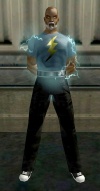Might for Right Act
Might For Right Act
The Might for Right Act was one of the most infamous laws in the history of meta-human civil rights. A law written as a special case draft for meta-human American civilians, the history of the Act only makes sense by taking into account the historical and political moment the US were living at the moment:
After World War II ended, a lot of super-humans who'd fought for the US left the service, leaving America weakened against the paranormal assets of its new enemies in the Soviet bloc. The intelligence community soon started fearing 'Meta-Gap' between Eastern/Western powers. (1)
To counter this, a CIA high rank member named Roger Vrabel pulled enough strings to get the Might for Right act passed in Congress.(1) This law proclaimed any US citizen with meta-human powers or paranormal abilities, super-powered individuals and vigilante heroes a valuable national resource subject to draft without notice into the service of the United States government. (2) Using these special powers, the government draft into service hundreds of metahumans, but few of them were actually recorded as entering military service. (1)
For the next decade the CIA, FBI, and Department of Defense routinely pressed heroes into service, both at home and abroad. Most were only too happy to help, but there were undoubtedly many, many abuses of the law. Heroes with unpopular politics found themselves sent on suicide missions into Eastern Europe. Minority heroes suffered particular discrimination during this period, often being forced into secret duty for months or years at a time, with no contact with family and loved ones. (2)
From 1956 to 1966, the vast majority of those heroes pressed into service were used to fight a covert war against the Soviet Union. While public hero organizations like the Freedom Phalanx and the Dawn Patrol carried on their seemingly never ending war against costume-clad villains, many of America’s "lesser known" heroes found themselves fighting and dying behind the Iron Curtain or in the jungles of South America and Southeast Asia. These battles, waged with ferocity by each side, did little more than maintain the status quo, often at the expense of local populations and governments. (2)
As constitutionally dubious as these policies were, the U.S. did not base its actions solely on paranoia. The Soviet Union had engaged in its own, even more abusive program for amassing super-powered spies and operatives. Through a series of often deadly and deforming medical experiments, the Soviets managed to assemble its own elite cadre of heroes. They fought on the front line of this cold war, going toe-to-toe with U.S. heroes in a hidden war that the public scarcely knew was being fought. Occasionally, a super- powered melee would boil over into the public eye, but for the most part the victories and deaths went unnoticed. (2)
Needless to say, the Act had notorious detractors such as Jim 'Thunderhead' Bartlett (1) and probably many others, but it was in 1967 when the Act would see the beginning of its end: In that year three African-American heroes working in Paragon City, Roger Washington, Georgia Reynolds, and Hakeem Muhammad (3), protested when they were selected by the Might for Right act, and argued that the Act had been used particularly to target poor minority meta-humans, as they wouldn't have the resources to fight it in court, and that the act also infringed on their civil rights by targeting them because of their meta-human status.(1) The country united behind their cause and there were public protests; when the CIA tried to arrest the three young heroes in Paragon, a whole battalion of heroes came to their help. (3) The case finally went before the Supreme Court.
Later that same year, and despite Roger Vrabel's protests, (3) the Supreme Court declared unconstitutional and overturned the Might for Right Act in a tense 4-3 judgment with 2 abstentions. (1) The high court ruled the law entirely unconstitutional and ordered the immediate cessation of all Might For Right draftee operations. In reality, it took close to three years for the last draftee to be freed from duty, as many were deeply entrenched in covert operations that the government was reluctant to close in a timely manner. (2)
Sources
1: CoH Story Arc: Melvin and the mysteryous Malta Group
2: CoH Official Site: Paragon City Backstory: The Cold War
3: CoH History Badge: Expert


